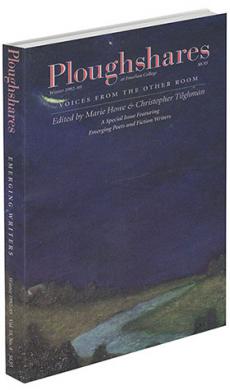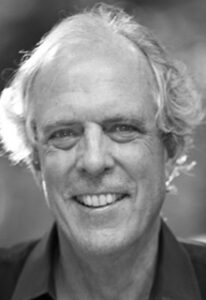rev. of Sweet Ruin by Tony Hoagland
"Perpetual Motion," the title of
Sweet Ruin's keynote poem, provides an apt analogue for Tony Hoagland's work. His muscular, conversational lines sprint from narrative passages to metaphorical clusters to speculative meditations, and then loop back, fast-talking and digressing their way into the book's richly American interior. Hoagland's poems grapple with selfhood and manhood, but they also consider the mysteries of national identity — how the social and the personal mutually impinge. "When I think of what I know about America,/I think of kissing my best friend's wife/in the parking lot of the zoo one afternoon," he says in "My Country." In the funny and moving Poem for Men Only," an off-hand rumination about the earliest patriarchies — "It wasn't easy, inventing the wheel" — lays the groundwork for a story about the hard labor of intimacy between a hospitalized father and his son keeping restive vigil, both men mutely "seeking what to feel."
Many of the poems in
Sweet Ruin behave like verse essays, recalling the root meanings of that word — to
test, to
try, to
venture out — as they cover ground by modulating voice or extending metaphor. Hoagland's edgy talk is never merely talky, and it often lingers over a moment of unalloyed lyricism, as when he finds the word "sunlight" on a list of
things to do: "It touches you,/as if you had a friend//and sunlight were a present/he had sent from someplace distant" ("The Word"). The title poem depicts, with acerbic irony, a father's willfully selfdestructive episode of adultery, then softens to a reflection on men's tendency to "make a huge mistake, like a big leap//into space, as if following/a music that required dissonance/and a plunge into the dark." After this metaphorical turn, the speaker faces his own temptations to "break my happiness apart/simply for the pleasure of the sound."
Hoagland's subjects are unabashedly Romantic — love and freedom, nature and spirit, self and community, memory and childhood — but his Romanticism is sturdy, practical. In "Volunteer," transcendence is to be measured "one aspirin, one teacup,/one traffic ticket at a time," and later in this poem he affirms that "part of our responsibility/belonged to joy." Yet he also recognizes, in "The Word," that delight requires work — "among your duties, pleasure/is a thing//that also needs accomplishing" — and in "Second Nature," one of the book's best poems, he sweetly but unsentimentally dissects the Romantic Self as "some kind of/irrationally-proportioned//Frankenstein,/on pilgrimage to god knows where,/humming a song as he lumbers through the forest."
The poems in
Sweet Ruin constitute that song-wise-cracking, bluesy, lyrical, and reflective by turns, capable of swift and subtle key changes. Hoagland's is some of the most sheerly enjoyable writing I've encountered in a long time. With his "foot upon the gas/between future and past," he dazzles and rants, praises and blames, and in his keen noticings and reflections, he "accomplishes pleasure" on almost every leg of the journey. It's deeply gratifying to be along for the ride.


